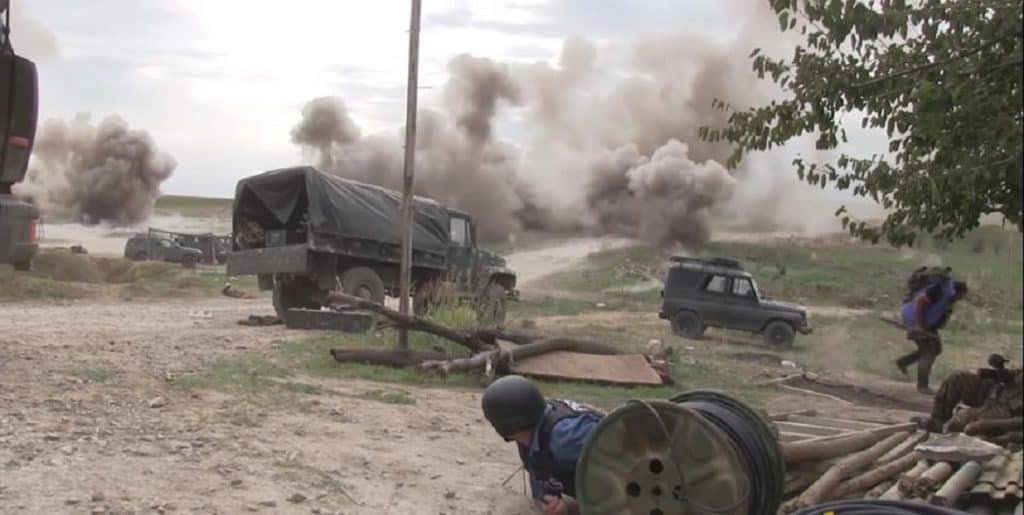Nikola Mikovic
Armenia-sponsored Nagorno-Karabakh army has lost several significant positions to Turkey-backed Azerbaijan’s forces amid renewed clashes for control over the disputed region. Ever since the conflict erupted on September 27, Yerevan and Baku have twice agreed on a ceasefire, but it was never implemented on the ground.

Moscow already hosted the Azerbaijani and Armenian Foreign Ministers Jeyhun Bayramov and Zohrab Mnatsakanyan, but their talks never resulted in a sustainable truce. Instead, according to reports, the Azerbaijani Army captured nearly the entire area along the border with Iran, and is rapidly advancing toward the Lachin corridor which is a key supply line for the Armenians. Without the Lachin corridor, Armenia’s main artery to Nagorno-Karabakh will be cut off, and will pave the way for the Azeri troops to capture Stepanakert, the region’s capital. So far the Armenian forces did not manage to launch any counter offensives, and are constantly retreating, especially in the south. At the same time, Armenian officials try to encourage its troops to keep fighting, claiming that “retreat in not a defeat” since there was a retreat in 1918, in 1941 and also in 1992, but in the end the Armenians won. This time, however, their chances are very slim.
Nagorno-Karabakh, also known as Artsakh, has been under the Armenian control for the past 26 years. The two countries fought a war between 1988 and 1994, which resulted in Yerevan’s victory. Armenia had enough time to prepare for the “second round” of conflict, but for some reason it did not. Since Baku never accepted the status quo on the ground, a conflict escalation was a matter of time. Azerbaijan bought large amounts of modern, sophisticated weapons, primarily from Turkey and Israel, but also from Russia – Armenian ally. Traditionally, both Armenia and Azerbaijan have been in Russia’s geopolitical sphere of influence, and Moscow has been playing a role of a regional arbiter. Over the years, Russian officials repeated on several occasions that relations with Armenia and Azerbaijan are equally important for the Kremlin. It is worth mentioning that the trade turnover between Russia and Azerbaijan reached $3 billion in 2019, which is much higher than the trade balance Moscow has with Armenia. Thus, Russia is hesitating from getting directly involved in this conflict, since that would have an impact on its relations with Baku. However, if Azerbaijan captures Nagorno-Karabakh – which seems to be a matter of time – Moscow will likely jeopardize its relations with both, Yerevan and Baku.
There are rumors that Moscow is hesitating from openly siding with Armenia not just because of the Kremlin’s business interests in Azerbaijan, but because of the Armenian Prime Minister Nikol Pashinyan’s alleged ties with American billionaire George Soros. Apparently, the Kremlin does not trust Pashinyan and is willing to let him lose the war, which could be interpreted as a Russian “punishment” for the 2018 Armenian color revolution. Still, it remains unclear why did Moscow allow the regime change to take place in a country that is a member of the Russia-led Eurasian Union, as well as Collective Security Treaty Organization (CSTO). There are speculations that the Kremlin is trying to get rid of some of its allies, especially those that do not have any natural resources. From the purely energetic perspective, such an action would make sense, but at the same time it would portray Russia as a completely unreliable partner. Thus, once the conflict in Nagorno-Karabakh is over, the Armenian leadership could start turning to the West, and foreign powers, primarily Turkey and the United States, could prepare the ground for the remaining frozen conflicts in the post-Soviet space – the Donbass, Transnistria and potentially Crimea – to turn into hot wars.
Indeed, according to Turkish Vice President Fuat Oktay, his country might send troops to Nagorno-Karabakh if receives such a request from Azerbaijan. Russia, on the other hand, has never given such explicit support to its ally. In other words, the Kremlin is sending clear signals to Baku and Ankara that Russia will not interfere to protect the Armenians in the disputed region. Without Russian intervention – which is very improbable to happen – Armenian forces in Nagorno-Karabakh will likely be defeated in the foreseeable future, and the self-proclaimed Republic of Artsakh could have the same fate as the former Republic of Serbian Krajina – a Serb-dominated entity in Croatia that was captured by Croatian forces in 1995. Given that Russian media largely ignored an open letter that Artsakh’s President Arayik Harutyunyan recently addressed to Russian President Vladimir Putin, asking to do everything possible to end hostilities, it is unlikely that the Kremlin will prevent the Azerbaijani Armed Forces from establishing full control over Nagorno-Karabakh.
In the meantime, hostilities are expected to go on, although both sides will try not to cross the “red lines”. For instance, in spite of Armenian shelling and firing ballistic missiles on Azerbaijan’s second largest city of Ganja, the Azeri Army did not retaliate by striking towns and cities in Armenia, since such an action would threaten to involve the CSTO in the conflict. On the other hand, Armenian forces carefully avoided targeting Azerbaijan’s energy infrastructure including pipelines that carry natural gas and crude oil from the Caspian Sea through Georgia to Turkey, even though such a measure would undoubtedly create serious problems for Baku. Also, a potential Armenian attack on Mingechevir Hydro Power Plant – the largest hydroelectric dam in the South Caucasus – could have fatal consequences for Azerbaijani industrial and civil infrastructure. This facility has a huge importance for Azerbaijan; during the accident at Mingechevir in 2018 most of the country was left without electricity. Still, Yerevan does not seem to be determined to raise the stakes. Instead, it is fighting a “semi-war”, and its leaders constantly call for a dialogue and compromise amid Azeri military offensive. On the other hand, the Azeri President Ilham Aliyev in his speeches often announces return of occupied territory, and rarely talks of diplomacy or ceasefire. In other words, backed by Turkey, and aware of Russia’s passive position, he relies on Azerbaijan’s military might.
If the Azerbaijani forces manage to capture Nagorno-Karabah, such an action will be interpreted not just as an Armenian loss, but also as a Russia’s geopolitical humiliation. Naturally, the Kremlin propagandists will try to portray it as another Putin’s magnificent victory, although in reality Russia will keep losing its positions in the Caucasus, while Turkey’s influence in the region will continues to grow.
Author: Nikola Mikovic (Journalist, researcher and analyst based in Serbia. He covers mostly the foreign policies of Russia, Belarus and Ukraine)
(The views expressed in this article belong only to the author and do not necessarily reflect the views of World Geostrategic Insights).
Image Source: Forbes/MoD of Armenia







